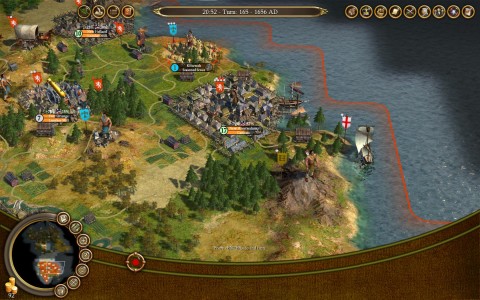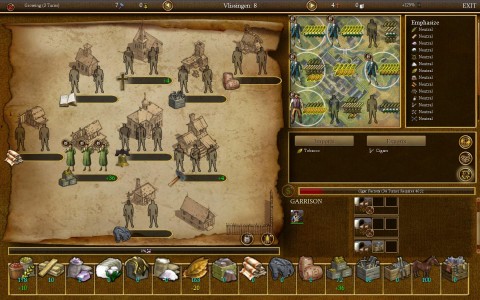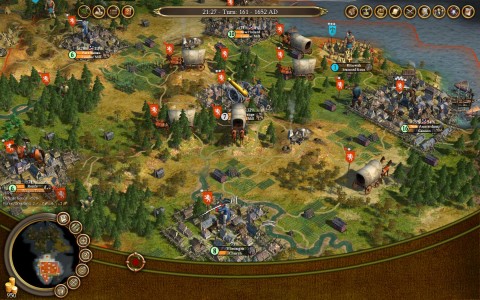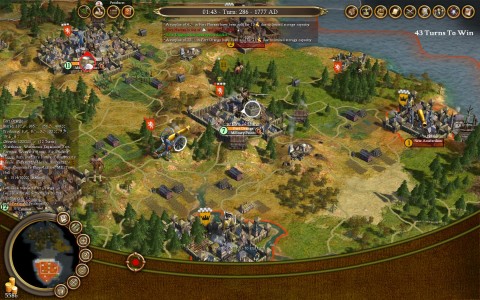
Do not be fooled by the Civ IV part of the title to the updated to the classic Colonization. You do so at your own peril; well, your colony’s peril. Colonization is primarily a game of economics while Civilization is primarily a game of domination. In Civ you work the tiles around your city and either get “money”, production, or food. In Colonization you work the tiles around your city and get cotton, tobacco, ore, sugar cane, and probably some other stuff I’m forgetting. And, while in Civ you simply use the production to build units and city structures, in Col you take all these raw products and produce finished products: cloth, cigars, tools, guns, rum, and coats.

My first attempt at Colonization was a disaster. I got about halfway through the game before it got too unwieldy and I decided to try again from scratch. Now I am the viceroy of a pretty successful Dutch colony. My wagon trains traverse the landscape, whisking raw resources and finished products from city to city. I’m sending colonists to native tribes to learn things like tobacco planting and cotton picking. (Which, as Danielle remarked, still sounds wrong…) And they have to go to the cities they are best for, so we don’t waste limited resources.
In a lot of ways, this is what I loved about the original Colonization over the original Civilization. While both games involve a certain degree of micromanagement, it always seemed a lot more intuitive in Col than in Civ. From the first Civ that offered the ability to have inhabitants be entertainers rather than working the fields (Civ 1 or 2? Not sure) until now, I’ve mostly played the same way – just leave the cities alone. Just grow them and worry about city improvements, climbing the tech tree, and having enough military units. Back in Civ 2, whenever people would revolt and it would ask me – I would make some people into entertainers. Nowadays, I mostly leave the specialist units as the ones that come with Wonders of the World. After all, it was always a little tough to see just what effect I was getting from having people entertained instead of working the fields. After all, why slow city growth when a larger city has more production capacity?
But with Colonization, it’s perfectly intuitive. I’m producing X amount of cotton. And my weavers are turning Y amount of cotton into cloth. If X > Y, I’m fine up until the point that cotton starts to spoil because I have exceeded my warehouse storage. If X = Y then things are perfect and it’s pretty rare to figure out this setup. If X < Y, I have too many people working on cotton to cloth conversion and that colonist can better suit things working somewhere else. Of course, things rapidly get more complicated than this. Perhaps one city has enough food to support lots of people working to make finished products, but is poor in those products. So a wagon train is built and shuttles the raw materials to that city to create the goods. And then, maybe that city is inland so I need another wagon train to carry finished goods to the port city where it can be shipped back to Europe for money. And, if this had to be done manually, this would be a game I would hate above no other. But you can simply automate the wagon trains (and could in the first version, as well) to carry goods around all the different cities. This is what killed Spore for me. Spore needed some kind of intergalactic wagon trains to do all the annoying spice trading. It really makes me think that perhaps the Spore team realized that there wasn’t much fun stuff to do in space and so they needed to occupy the player’s time grabbing spices and trading them all over the universe. Seriously, what kind of people is advanced enough for intergalactic space travel, but not smart enough to create some kind of stock exchange to automate that crap?

Anyway, back to Colonization. Really, the only thing I never liked about the original Colonization (and I haven’t had to deal with in new one) was revolution time. First of all, this assumes that all colonies want to be their own countries. Sure, this has happened a lot during history. But sometimes colonies are OK remaining colonies (see Puerto Rico!). But that’s just a silly argument. The real problem is that I have always hated combat in these games. This says volumes about my philosophies and fantasies about how the world should work, but really it was just about interrupting this system that I spent most of the game building up just to have a war and then the game was over. In other words, whether Sid Meier intended to do this or not, Colonization is a commentary on the futility of creating complex systems. They will inevitably be torn apart by war. Or, to be put another way, why not attract a bunch of soldier immigrants and declare war immediately? Why spend around 80-90% of the game building up an economy with Europe to then wage a war and have the game end?
It seems like a cruel joke on the player. Most games have the player build up their attributes as the game goes along until they are able to use said attributes to win the game. Perhaps you learn how best to shoot under cover. Perhaps you gain units that will be useful again the main bad guy. Or maybe you just learn how to think strategically within the game’s world. (Similar to the point of going to University in real life) But Colonization spends the entire game teaching you how to run an awesome economy and then asks you to militarily defeat the enemy. It’s like training for ice skating by swimming. In a way, the reality of the simulation intrudes upon the gamer’s sandbox-like fun. The point of the game is to simulate historical colonies and their desire to win independence. So the current endgame is inevitable.
But here’s what I would like to see – an expansion pack: After Revolution. Sort of an analogue to Civ IV: Beyond the Sword. If there is no elegant way to have a diplomatic, space race, or cultural victory (all possible victory conditions in Civ IV), perhaps there can be a new experience after revolution. After all, the developers long ago realized with the Civ franchise that there were many players who preferred to play what is known in the gaming world as a turtle strategy. Have strong enough defenses that the enemy cannot defeat you militarily while leaving the enemy alone. Then winning via space race or cultural victory. It still says a lot about the opinions of the game developers that most victory conditions will give a lower score than conquering all other races via military offensive. But, at least the options are there. Dan gets a thrill out of destroying enemy cities. For me, the whole event is a nerve-wracking time until I have defeated the enemy. Have I miscalculated? Do they really have much stronger units than I? It has taken me all these years to become a more aggressive player and I still am nothing compared to Dan (and maybe the majority?).
This gameplay style extends to all the games I play, even where it is less suitable. I get a bit of game-related joy from climbing the tech tree and building advanced units and buildings. So even in Age of Empires or World of Warcraft, I tend to eschew an early kill/win of the other players by building up my fortress and unit mass. Even then, I may lose, but at least I had the fun of building things up. It is telling that at the end of the game, I often have 25% or more or my unit slots taken up by workers, busy with deforestation as though their mission was to scorch the Earth.
But the point is that I’m not a huge fan of the combat. And it’s not because I always lose to Europe in Colonization; I often win. I just don’t enjoy that phase of gameplay. As I mention for the third or fourth time now, I have spent the better part of 10 or more hours building up my economy and optimizing my cities. I don’t want to wage war and then start again from scratch! So, join me in momentarily envisioning an expansion pack I am sure will never be released (since Civ 5 comes out this year). If my colony MUST declare independence because that’s what happens historically, then I’d like to continue the narrative. Like the USA (in real life), you would have to make peace with Europe so you could continue to trade with them. Also, perhaps you could provide military assistance (units or guns) to other colonies who are inspired by you (like real life South America) and want to overthrow their European overlords. Also, perhaps the game now becomes a trading game where there’s a trade-based victory condition. Perhaps, become the world leader in coat production or something. Part of the reason this game has probably never been made is because it would be hard to come up with a second victory condition, but I would be all over said game.
Anyway, issues with the endgame aside, I’m having a good time with Colonization and I hope it eventually gets released as a total conversion of Civ V or Civ VI.
Post Script:
Between the time I wrote this and it was scheduled to appear, I finished up my Dutch game. I discovered one bit of broken-ness in the game during war, although I may just be ignorant about a button or option. Whenever an enemy approaches, wagon trains stop in their tracks if they’re within a certain amount of tiles of the enemy. This is good in that it keeps you from losing all your wagon trains because they blindly drive right within the range of enemy units. However, I could not figure out an elegant way to reassign the wagon train to its former trade route. And with over 20 trade routes going on, it wasn’t easy to figure out what they used to do. I guess I can rename the wagon train, but that’s a bit clunky.

As I anticipated, war broke the fun for me. Suddenly, all trade stopped (as enemy units approached) and cities just ended up with tons of raw materials. And it wasn’t fun to fight the war, although I did emerge victorious. I learned that dragoons are useless for defense and soldiers are useless for offense. I don’t remember how the original Col was, but I thought I remember dragoons just being an improved solder and that you wanted to make all your soldiers dragoons if possible.
Once I got the hang of the game and using dragoons to attack, I swiftly ended the game. As far as I could tell (at least at the easiest difficulty level), the enemy does not increase his military force at all once revolution is declared. This leads to the game getting a little game-y and, therefore, broken. (I do especially hate being reminded that I’m playing a game when I’m doing these sims/strategy games (it’s ok in Mario)) Because if you are generating too many liberty bells throughout the game, the king is increasing his military. So the best strategy is to play until you’re ready to stop playing and start the revolution and then build up your liberty bells extremely quickly so that he doesn’t have time to increase his military too much. Also, you don’t want to have too many cannons already built up or too many units acting as military. (Because that scares the king and he increases his military) You just want a bunch of guns in the armory and a bunch of horses in the stable. Again, as I mentioned above with the whole revolution aspect, I think they basically “broke” the game to make it more historically accurate. After all, most of the colonial army was a militia. Everyone went to the armory, got soldiered up and then fought around. And I really hate this.
I used to love Sim City. It had a place in the video game part of my heart nearly as dear as Civ. Then, with Sim City 4, things got crazy complex. We all enjoyed this because it appealed to every reason why we enjoyed a freakin’ city planning game. It was neat to be able to tweak it to our heart’s desire. But, unfortunately, it became too complex for the game designers. There were all kinds of weird bugs around how the city grew and how the sims took mass transit. (or even highways – which I often found more than useless) And so I found online a way to design your cities so they could grow into a metropolis. I was thrilled because I could never get my cities big enough to get all the population-related gifts. But it ended up killing the game for me. The strategy ended up producing ridiculously abstract cities that all looked exactly the same. And if I’m going to do that, it suddenly becomes tedious to play. There’s no creativity, I’m just playing a pattern to win. So it left me in an ugly place. On the one hand, no one is forcing me to build my city that way. On the other, I know my city’s population is artificially crippled if I don’t.
In the end, I like Col and I’ll probably start up another game in a few days. But I don’t enjoy it as much as Civ 4. I think they got that one much more right. Then again, they’re on their fourth try (and boy did Civ 2 have some issues!) while Col is only one its second try and it isn’t even it’s own full game (it’s a total conversion of Civ 4).


2 responses to “Sid Meier’s Civilization IV: Colonization”
I love the game, but it’s not quite as well-realized as the Civ series. Hopefully sales were good enough on this total conversion that we might see more start to be made in the future.
If we can get the total conversion earlier in the life of Civ V, then they might be able to justify some expansion packs. I’m afraid some of the enthusiam that might have resulted in people clambering for a Civ V version might have been sapped by the fact that it wasn’t as good as it could have been. Then again, if he’s going to follow the same pattern as before, perhaps we won’t get another Colonization until Civ VI.